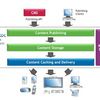By Erin Harrison
With the world’s overall energy demand increasing by what seems to be the hour, deployment of smart grids presents new opportunities for utilities and service providers – but first they need to weigh all the factors involved in the future of smart grid.
According to the International Energy Agency (IEA), global energy demand is expected to rise by nearly 40 percent between now and 2035, as cited in a recent Alcatel-Lucent article, “Anticipating the Future’s Smart Grid Economy.”
Power utilities are indeed presented with new revenue opportunities, but they need to determine how they fit in to the future Smart Grid.
Years from now, the Smart Grid will change our lives: it will impact our business landscape, the energy marketplace and the ways in which we interact socially and culturally. In addition it will enhance control and convenience in the industrialized world while helping positive social progress in developing nations. When and how well these benefits gain traction will depend on how well energy providers manage change.
Citing the opinion of Ravi Krishnaswamy, vice president, Energy Practice, Frost & Sullivan, Alcatel-Lucent said the optimal smart grid value proposition depends on numerous factors related to regional needs, national priorities, technology development and regulatory environment.
“It’s not a one size fits all situation,” says Krishnaswamy. “Each utility will have to weigh these factors, then arrive at elements of Smart Grid that works for them.”
Renewable energy market will start taking a significant share of the power source in many countries. Krishnaswamy notes that smart grids are essential for utilities and nations that want to grow their renewable generation base, which itself is a key element in the equation for meeting future demand
Smart grid adoption will vary from community to community based on markets being served, regulatory environment and other factors.
As Alcatel-Lucent points out, smart grid technologies are changing business models for power providers in several ways, including deferred investment in expensive power plants, reduced maintenance and service costs, more efficient and reliable load management and that expected proliferation in potentially lucrative smart services using the smart grid’s communications infrastructure.
While much progress has been made with today’s smart grid, the smart grid of the future will impact our business landscape, the energy marketplace and the ways in which we interact socially and culturally.











